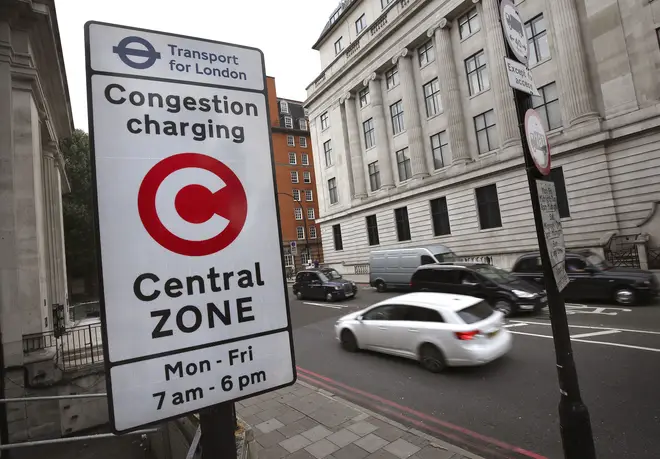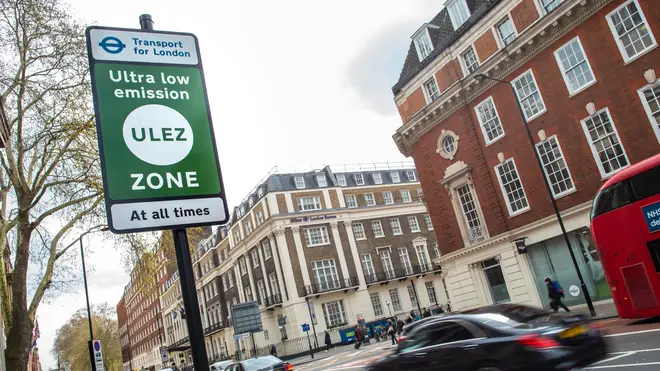
Shelagh Fogarty 1pm - 4pm
15 May 2020, 21:13

London's congestion charge will be reinstated on Monday, May 18 and prices will go up next month in order to pay off the £1.6 billion government bailout.
London Mayor Sadiq Khan accused the Department for Transport (DfT) of "making ordinary Londoners pay the cost for doing the right thing on Covid-19" by reinstating the congestion charge.
On Thursday he told LBC, Transport for London would require a government bailout by the end of the day to prevent them having to cut down services.
But under the terms of the bailout, fare freezes must be removed and the fee for driving in the capital must be re-introduced - so how much is the congestion charge now? And what days and times does it start?
Fare income has dropped by 90 per cent during lockdown and as a result the cost of travelling around the capital will have to go up.
So how will the price hike affect you? And when will the changes come into effect?

Sadiq Khan warns TfL will run out of money today without government grant
The daily fee for the congestion charge will increase by from £11.50 to £15 - a 30 per cent increase.
In addition, the number of hours and days that the rule will apply to is also going up - from between 7am and 6pm on weekdays, to between 7am and 10pm every day of the week.
However, NHS and care home staff who work in the congestion charge area will be reimbursed for any journey taken that relates to them tackling coronavirus.
We needed to secure a deal to keep @TfL operating, but the Government has forced Londoners to pay a very heavy price for doing the right thing on #Covid19 - by hiking TfL fares, stopping the Freedom Pass during busy times and loading TfL with debt.
— Mayor of London (gov.uk/coronavirus) (@MayorofLondon) May 15, 2020
The new congestion charge rules will begin being enforced from 22 June onwards.
However, the amendments are provisional and will be reviewed by TfL as part of the £1.6 billion government bailout.
London's congestion charge and the ultra-low emission zone (ULEZ) have been temporarily suspended during the coronavirus crisis, but will both be reintroduced on Monday 18 May.

Under the terms of the government bailout, the congestion charge is being reinstated from Monday to keep Tube and bus services running in the capital until the end of September.
The price hike will go towards paying off the £1.6 billion granted to TfL by the government.
Mr Khan has also expressed anxiety over an upsurge in car usage as people return to work, which would see "toxic air pollution soar."
This also explains the fee's increase, however it could put pressure on public transport that is already struggling to enforce social distancing measures, which could lead to a second Covid-19 spike in the capital.
Prime Minister Boris Johnson's official spokesman said: "The congestion charge is an important tool to ensure that emissions in London remain low and support better air quality."
COVID-19 will fundamentally change the way we travel around our city.
— Mayor of London (gov.uk/coronavirus) (@MayorofLondon) May 15, 2020
That’s why today, @TfL and I are announcing our plans to make central London one of the largest car-free zones in any capital city in the world, increasing walking and cycling and improving our air quality.
The Mayor has urged people "to walk and cycle to make this work," in a bid to ensure London remains one of the largest car-free areas in any capital city in the world."
Mr Johnson's official spokesman said people should continue working from home if they can and avoid public transport wherever possible.
He echoed the Mayor's call for people to walk and cycle to work.
Some streets will even be converted to walking and cycling only in an attempt to encourage active travel.
TfL's director of surface transport Gareth Powell added: "To prevent the city clogging up, and to support the greater levels of walking and cycling that will be vital to London's restart, we are reinstating road user charging schemes and making walking and cycling easier and safer than ever before."

Sadiq Khan outlines plans for TfL when schools return
Conservative MP Iain Duncan Smith warned that reintroducing the fee will "punish key workers and those not able to work from home."
AA president Edmund King said extending the charge to Saturdays and Sunday was "difficult to justify" due to low traffic levels, and means it is changing "from a congestion charge to a taxation charge."
Liam Griffin, chief executive of London minicab firm Addison Lee, said upping the fee and increasing the charging hours would "almost double" the weekly costs for a driver.
"This move from TfL shows a patent disregard for a profession that has done so much to keep London moving during the crisis and will have a critical role to play in supporting London as it returns to growth," he said.
I urge the @MayorofLondon to use some common sense: don't reintroduce #CongestionCharge & #ULEZ at this time. It will punish keyworkers & those not able to work from home being encouraged to start work again
— Iain Duncan Smith MP (@MPIainDS) May 15, 2020
It's a disgraceful act by a Mayor that does not take responsibility(1/2) pic.twitter.com/JtTOIKsfzt